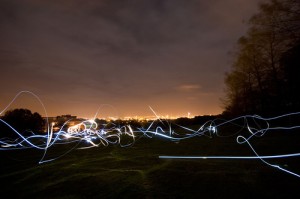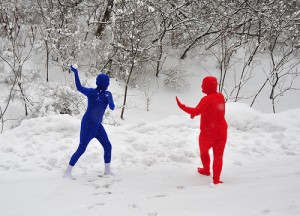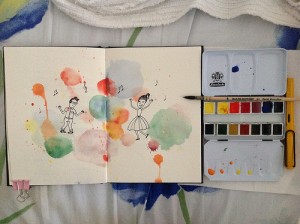Can public history play? A conference pop-up preview
13 April 2015 – editors

Photo credit: Rick Harrison
It’s the week of the National Council on Public History Annual Meeting, and you’re getting ready to jet off to the Volunteer State.
You’ve watched the requisite Tennessee-based movies: The Thing Called Love, Inherit the Wind, and The Blind Side.
You’ve got your must-do list all set–a visit to the Grand Ole Opry (wait, since when is that in a suburban shopping center?), a night out at the Blue Bird Café, and a lunch date with your college roommate at The Wild Cow.
Now, like all good public historians, you pull up the program and begin to map out your conference schedule.
- THATCamp NCPH Boot Camp on Wednesday afternoon? Check.
- “History on the Cutting Edge” on Saturday and the Nashville Crime Walking Tour Friday? Add those to the list.
- And speed networking on Thursday morning? You definitely want to make time for that.
But wait. You have a free two hours on Thursday afternoon. How will you ever fill the time?
Do you:
(a) Rent a car, fight traffic, and drive all the way to the Hermitage to contend with the throngs of tourists?
(b) Sneak over to the hotel bar, order a bourbon, neat, and sit in the corner grading papers from your world survey?
(c) Head over to the main ballroom and visit the “Free, Separate, Uncertain Play Station” in Ballroom 1-3 between 2:30 and 6:30 p.m., where you’ll find games, snacks, and conversations about PLAY in Public History?
Rerouting
You’re sure glad you paid for the GPS in the rental car. You’ve never been to Nashville before and aren’t very good with directions anyway. Hard to believe this is your first trip to the Hermitage, considering your whole career has been at historic house museums. You punch “Hermitage historic site” into the GPS, and the soothing female voice tells you to make a left turn. You’re on your way.
Two hours later, you begin to think that something’s wrong. It’s only a few miles away, right? You check the GPS and realize that it’s giving you directions to The Hermitage historic house in Ho-Ho-Kus, NJ! Panicked you make a U-turn and spin into the drainage ditch. The last thing you hear before passing out is the GPS saying, “Rerouting.”
Grading
“Here’s that bourbon. You sure you don’t want to see a menu?” The server asks in a friendly voice tinged with concern. After all, this is your third. But these papers! What class were these students attending? Clearly, not yours.
“Maybe in a little while,” you say, draining the last drops of glass two before surrendering it.
You settle back comfortably as he walks away and turn the page on yet another essay on Ghengis Khan when you hear a familiar voice. Being led to the next table is your grad school advisor and the chair of the department where you just applied for a job! What an opportunity! You jump up, hit your head on a low-hanging light fixture, fall out of your booth and directly onto your old advisor. Your maybe-hopefully new department chair trips over you both. He yells, “My ankle! Call a doctor!”
In play
Good choice!

Photo credit: Len Radin
You’re dubious at first. An interactive public history play station sounds entirely too fun for an academic conference, but you know that NCPHers aren’t your average conference-goers.
Do you:
- Start with the Game Station, well-stocked with historically themed video games and party games?
- Head straight for the Memory Wall, an interactive space for remembering play?
- Get your grammar on with Public History Madlibs?
Game Station
You walk up to the table to find a laptop. You awaken the screen and up pops a game you’ve never seen before. “Papers, Please”? Hmm… What’s this?
The communist state of Arstotzka has ended a 6-year war with neighboring Kolechia and reclaimed its rightful half of the border town, Grestin. Your job as immigration inspector is to control the flow of people entering the Arstotzkan side of Grestin from Kolechia…
You’re intrigued.
Next to the computer, you see a box–“Timeline.” You’ve heard of that before. Isn’t that the game that you played at your quirky neighbors’ Lunar New Year party a few years back? The one where you put events in their correct chronological order? It sounds simple enough, but who knows whether wine was invented before kerosene lamps, whether the Battle of Hastings preceded the Crusades?
And really, what do these games have to do with public history?
You pause and wonder, what can these games really teach us about the past? Can they enhance historical learning? Is it appropriate to bring games into such serious historical work? You wonder… is there a way you could be more playful in your own work with the past?
You put a note in your program to go to the Friday working group on play. (Turn to page 30 in the program to attend Friday’s working group and continue your adventure. Or follow the hashtag #PlayNCPH on Twitter and Instagram.)
Memory Wall

Photo credit: congalaconga
When you get to the Memory Wall space, you see a group of people writing on post-it notes, including your conference mentor. “What are you writing?” you ask. “All about my first game of dress-up,” she says. “My brother and I pulled a bunch of old clothes out of the attic and pretended that we were archaeologists exploring the pyramids of ancient Egypt. I’m pretty sure my parents had just taken us to see that King Tut exhibit.” She pauses. “Maybe that’s why I decided to be a public historian.”
You glance over the other notes. They each catalog memories of play and how it can be meaningful in our understanding of ourselves and our history. You think of yourself and your collection of Legos, how you used to put yourself in other places and times using them. And how different your great grandparents’ playing was, without all these branded toys. Someone steps back to take a photo of their note for Instagram. You take his place and begin writing out your memories. “There’s a working group on play tomorrow,” your mentor tells you, as she leaves. (Turn to page 30 in the program to attend Friday’s working group and continue your adventure. Or follow the hashtag #PlayNCPH on Twitter and Instagram.)
Who remembers Mad Libs?
You haven’t played Mad Libs since you were a kid. The instructions are easy: “Grab a blank Mad Libs sheet, find a partner and get started!” You see someone else eyeing the Public History Mad Libs. “You want to be my partner?” you ask. “Sure!” she says. You each take different sheets that describe public history scenarios. You ask her for a couple adjectives, some nouns, and so on. When you read her responses back to her as part of the story, you both laugh. How silly! She pauses and adds thoughtfully, “Maybe there’s something more to it. We all take our work so seriously. What if we tried to have more fun with public history?” You nod. “Some of the answers almost seemed like commentary about public history, even though you didn’t know the story when you were giving me words.” You put a note in your program to go to the Friday working group on play. (Turn to page 30 in the program to attend Friday’s working group and continue your adventure. Or follow the hashtag #PlayNCPH on Twitter and Instagram.)
~ Abigail Perkiss (Kean University) and Mary Rizzo (Rutgers University-Newark) will be facilitating the Working Group “Free, Separate, Uncertain: Can Public History Play?” on Friday morning at the NCPH Annual Meeting. The pop-up activity they describe here will take place in Ballroom 1-3 on Thursday, April 16 from 2:30-6:30 p.m.




Here’s a storify of our working group, in case you missed it: https://storify.com/rizzo_pubhist/can-public-history-play
And if you’re interested in more resources on play and public history, join and contribute to our Zotero group https://www.zotero.org/groups/play_and_public_history.